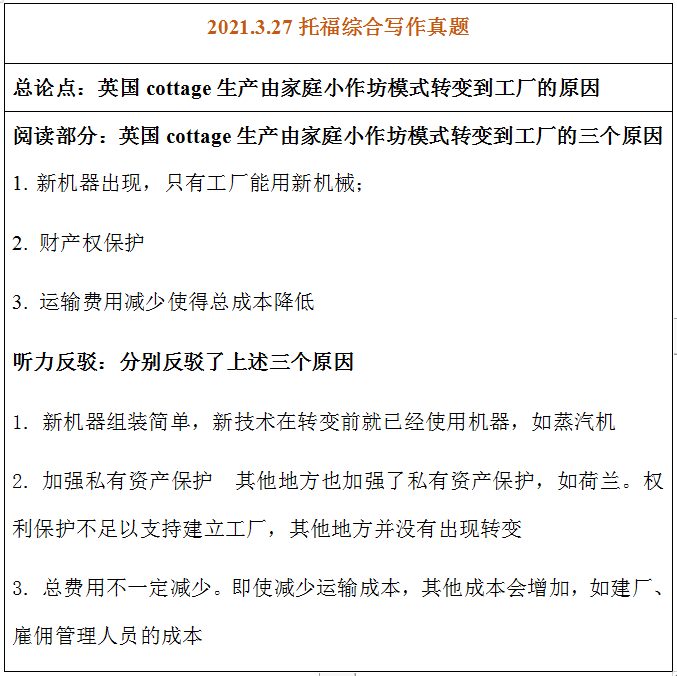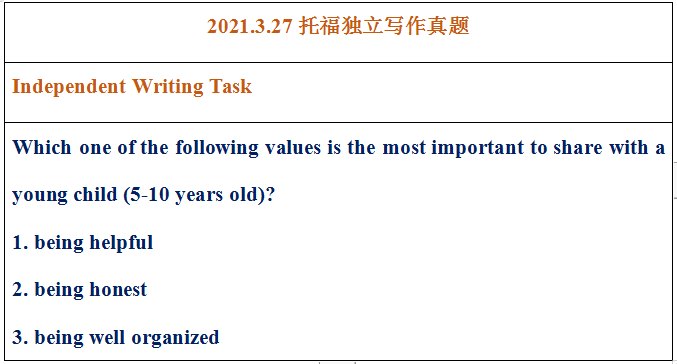

解题思路:
此题是阅读材料提出某个现象出现的三个原因,而听力材料分别反驳这三个原因的综合写作题型,需要考生抓住听力中反驳的要点,并在文章中进行尽可能详尽的复述。
本题考查的话题属于托福综合写作中的历史类话题,探讨的是“英国cottage生产由家庭小作坊模式转变到工厂的原因”。在TPO中有部分题目涉及到了历史类话题,如TPO8、TPO28、TPO30、TPO32、TPO35、TPO44。考生可适度选择上述提到的TPO材料,熟悉相关话题,分析材料结构和写作结构。
可以类比TPO30的综合写作:古希腊军队用burning mirror攻击古罗马舰队是否是真实的
TPO 30 综合写作
阅读部分:古希腊人使用burning mirror抵挡古罗马舰队不是真实事件的三个理由
· The ancient Greeks were not technologically advanced enough to make such a device古希腊人的技术还不够先进,不足以制造这种装置。
· The burning mirror would have taken a long time to set the ships on fire. 镜子要花很长时间才能点燃船只。
· A burning mirror does not seem like an improvement on a weapon that the Greeks already had: flaming arrows. 镜子不如希腊人已经拥有的火箭那么有用。
听力反驳:古希腊人使用burning mirror抵挡古罗马舰队是真实事件的三个理由
· An experiment has shown that dozens of small individually flat pieces of polished copper could be arranged into a parabolic shape and form a large, burning mirror. 一项实验表明,几十块小而平的抛光铜片可以排列成抛物线形状,形成一个大而燃烧的镜子。
· Roman boats were not made just of wood. There were other materials involved. The ancient boat-builders used a sticky substance called pitch. Pitch catches fire very quickly. An experiment showed that pitch could be set on fire by a burning mirror in seconds. 罗马船只不仅仅是木制的。还有其他材料。古代造船者使用一种叫沥青的粘性物质。沥青着火很快。一项实验表明,燃烧的镜子能在几秒钟内点燃沥青。
· Roman soldiers were familiar with flaming arrows and would have been watching for them and were ready to put out the fires they might cause. But you cannot see the burning rays from a mirror; you just see the mirror. 罗马士兵对火箭很熟悉,他们会一直盯着它们,随时准备扑灭它们可能引起的火灾。但是你看不到镜子里燃烧的光线,你只能看到镜子。

题目解析:
3月27日的托福独立写作探讨的是:“对于5-10岁的儿童,教会他们哪种品质是重要的——乐于助人、诚实守信还是井井有条?”。这是一道三选一的题目,我们可以任选“好好坏”、“好坏坏”和“对比法”三个方法中的一种来完成写作。
本篇范文使用了“好好坏”的写法,即分三个主体段,分别论述所选观点A的好处1、A的好处2、未选观点B以及未选观点C的坏处,以保证每个点都能论述到位。这里选择了第二个选项作为观点——“诚实守信”,因此第 一个主体段论述的点为:“诚实守信是做人的基本准则,是一定要教会孩子的品质”。第二个主体段论述的点为:“教会孩子诚实守信可以让他们获取其他人的信任交到更多朋友”。第三个主体段论述其他两个选项的缺点:“2-10岁的孩子年龄太小,自己甚至都无法管好自己,何况帮助他人;教孩子井井有条可能会影响他们的创新能力”。
请参考如下范文:
Education, to some extent, seems to be an issue that a vast majority of parents nowadays are concerned about. With regard to the discussion about which values shared with children aged five to ten years old should be given top priority, opinions vary from one person to another. From my point of view, among the three choices mentioned above, being honest is bound to be the most fundamental. I will elaborate my standpoint in the following paragraphs.
To start with, regarded as one of the most significant ethical codes, honesty is supposed to be shared with children at an early age. Those who are able to maintain virtue such as honesty will undoubtedly be rewarded in certain ways someday. It is universally acknowledged that honest people can acquire more esteem and appreciation from others, which means they will live in a rather kinder atmosphere no matter at school or in professional settings. By contrast, those who tend to cheat others may be confronted with more embarrassment and deception. However, so young the children are that they can hardly know the terrible consequences of telling a lie. Hence, if honesty can be implanted deep down in the kids’ hearts, they may find it precious and marvelous later due to a lot of unexpected benefits brought by it.
In addition, honesty will bring kids more friends. As is known to all, those who are honest can attain much more trust from others, since nobody will refuse to make friends with people who possess noble qualities. Therefore, enabling children to be honest will be conducive to their expansions of social circles. As you can imagine, an honest kid will be welcomed by his classmates at school, which means that he can get along well with a great proportion of students. In that case, when it comes to group work, others will be more willing to cooperate with him, thereby leading to high efficiency. Moreover, if he falls in a tight spot, others are more likely to offer support and a helping hand.
Although being helpful and being well organized are both crucial qualities as well, it may not be an appropriate period to share them when kids are five to ten years old. On the one hand, kids at this age can barely take care of themselves well, not to mention attempting to provide help to others. After all, the premise of being helpful is being independent first, which seems difficult for young kids. On the other hand, teaching children to be well organized, as a matter of fact, may have a negative influence on the cultivation of their creative thinking.
In conclusion, I still firmly believe that sharing honesty with children aged five to ten years is the most important. I suggest that parents should lay more emphasis on moral education, which, in all sorts of aspects, affects their kids’ future.